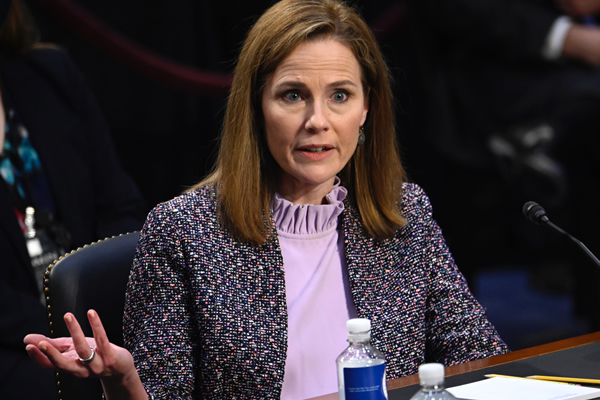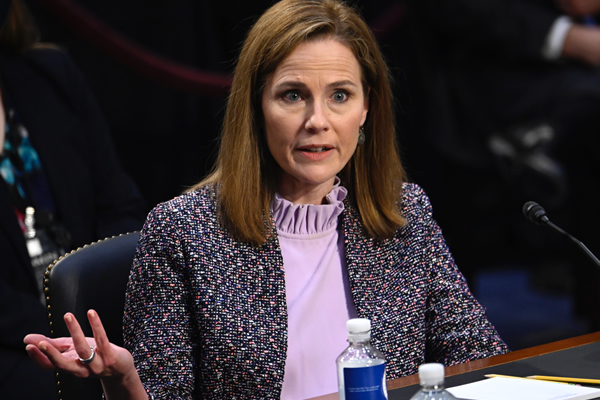

In a Hail Mary bid to thwart the expected confirmation of Amy Coney Barrett to the U.S. Supreme Court, cries have emerged that she poses a threat to marriage equality — and leading that charge is the named plaintiff and defendant in the lawsuit that extended marriage rights for gay couples throughout the country.
Jim Obergefell, the widower who sued Ohio to ensure his name would appear on the death certificate of now deceased spouse John Arthur, and Rick Hodges, the Republican official who represented the state in denying him that right — but a supporter of same-sex marriage — both took part Tuesday in a Zoom call with reporters against Barrett’s confirmation.
Obergefell, pointing to comments Barrett has made in the past about Chief Justice John Roberts’ dissent in his lawsuit, said he fears with Barrett on the bench following her nomination by President Trump, marriage rights for gay couples would be “chipped away.”
“I remember clearly what life was like before the day that the right of same-sex couples to marry became the law of the land,” Obergefell said. “We were able to have at most what [Ruth Bader] Ginsburg called ‘skim milk marriages’: Marriages in which, depending on state laws, we were not recognized as the families that we are.”
Fears over the potential vulnerability of same-sex marriage were heightened this month after U.S. Associate Justices Clarence Thomas and Samuel Alito issued a statement essentially declaring war on the Obergefell decision, citing insufficient protection for religious liberty. If Barrett were to replace progressive champion Ruth Bader Ginsburg on the Supreme Court, the court would have a new 6-3 conservative majority in any re-evaluation of the case.
Hodges, despite being the official blocking Obergefell’s placing his name on his spouse’s death certificates, said when the ruling came down from the Supreme Court in 2015 for marriage equality, “I did everything I could to prepare my department for marriage equality and equal treatment of all Ohioans marriages.”
Breaking with his party as a Republican in opposition to Barrett, Hodges said he thinks that work could be undermined with her confirmation.
“I fear that what’s at stake with this fateful nomination to replace Justice Ruth Bader Ginsburg, that all Americans are treated with full dignity and respect regardless of who they are or whom they love, and that all American families benefit equally and fully from government services they pay for through their taxes,” Hodges said.
Hodges during the call said joining with Obergefell in opposition to Barrett’s confirmation was a “real pleasure,” adding the two are “bound by our names on a historic, momentous and frankly wonderful decision.” Obergefell said at the start of the call the two have become friends.
For her part, Barrett during her confirmation hearing last week before the Senate Judiciary Committee said Obergefell “clearly says there is a constitutional right to same-sex marriage,” she wouldn’t budge from no comment on whether she’d vote to overturn the decision, most notably in an exchange with Sen. Richard Blumenthal (D-Conn.).
“[You’re] implying that I’m poised to say I want to cast a vote to overrule Obergefell, and I assure you, I don’t have any agenda, and I’m not even expressing a view of disagreement with Obergefell,” Barrett said. “You’re pushing me to try to violate the judicial canon of ethics and to offer advisory opinions, and I won’t do that.”
But Barrett has already articulated personal and religious opposition to same-sex marriage. In 2015, Barrett signed with other Catholic women a letter to bishops affirming marriage is “founded on the indissoluble commitment of a man and a woman.”
Barrett has also admitted to taking speaker fees from a legal fellowship affiliated with Alliance Defense Freedom, a group that fought against same-sex marriage and other LGBTQ rights across the board.
Denise Brogan-Kator, interim CEO for the LGBTQ group Family Equality, said in the conference call with Obergefell and Hodges the confirmation of Barrett based on her past statements would be “an LGBTQ rights emergency.”
“I’d like to say that if the 1,200 rights and responsibilities attendant to marriage are chipped away, one by one, state by state, then we might have marriage, but we won’t have marriage equality,” Brogan-Kators said. “That is not the vision of the Obergefell v. Hodges decision.”
Although LGBTQ advocates are sounding the alarm over Barrett’s confirmation that could lead to a roll back of same-sex marriage, legal experts have downplayed that threat, although they conceded indirect challenges are still possible.
If Barrett were to end up being the deciding vote in a re-evaluation of the issue before the Supreme Court, it would likely come in the form of a state challenging the legality of the Obergefell decision — either in the form of a state legislature passing a new law against same-sex marriage or a state official simply declaring the decision was incorrectly decided.
At least one such declaration is already pending before the Supreme Court in terms of birth certificates. Indiana Solicitor General Thomas Fischer has filed a petition asking justices to take up Box v. Henderson, a case to determine whether Obergefell applies to the birth certificates of the children of lesbian parents. It would take a vote of at least four justices to agree to take up the case.
“[T]he Court should take this case for plenary review and hold that Obergefell does not preclude states from reasonably (and rebuttably) presuming that a birth-mother’s husband, but not a birth-mother’s wife, is the biological father of her child,” the petition says.
The Obergefell decision, however, explicitly addressed the birth certificate issue and the right for same-sex parents to place both their names on their child’s birth certificate was reaffirmed in 2017 in Pavan v. Smith.
A state most likely to mount a challenge to Obergefell could very well be in the South, where polls show support for LGBTQ rights is weaker and politicians in recent history — most notably Roy Moore in Alabama — have railed against same-sex marriage to win public favor.
Jay Barth, a political scientist at Hendrix College and author of “The South and the Battle over LGBTQ Rights,” told the Washington Blade he’s “not immediately expecting” states in the South to challenge Obergefell, making the case for “a tale of two Souths right now in terms of these issues.”
“Look at the states like Georgia and Florida and Texas that have now really become more New South states with significant LGBTQ populations and straight populations increasingly, pretty well educated, that are not into that issue anymore,” Barth said. “But then there are rural southern states and I think you put Alabama, Mississippi, Arkansas, Louisiana in that camp, where you’re maybe more likely to see anything like that.”
The Blade reached out to offices of the state attorneys general in Alabama, Mississippi, Arkansas and Louisiana seeking comment on whether they’d seek to challenge the Obergefell ruling. The only response came from Amanda Priest, a spokesperson for Arkansas Attorney General Leslie Rutledge, who said, “The Attorney General does not have any pending litigation with respect to this matter.”
Barth, however, concluded his “gut” feeling is a direct challenge to Supreme Court precedent like Obergefell won’t happen and states would be more likely to challenge LGBTQ rights with state religious freedom laws allowing the denying of services to same-sex couples or a group refusing to provide marriage benefits to same-sex couples.
“I think we probably have some hints of where the new justice will fall, that she’s probably more likely to fall in the hardcore camp with Alito and Thomas, but I think we’re still not positive there,” Barth said. “Clearly, there will be a battle within the conservative majority to move her to their side with the chief justice on one faction and Justice Alito on the other side to get her to come down on any issue.”
The chances of defeating Barrett’s confirmation in the U.S. Senate — where a confirmation vote is scheduled for Monday — are slim to none. Sen. Minority Leader Chuck Schumer on Wednesday sought to adjourn the Senate until after Election Day to block Barrett’s confirmation vote, but that motion was defeated in the Senate by a vote along party lines.
Polls have shown a bare majority of the American public backs her confirmation. A Morning Consult poll made public on Wednesday found 51 percent of American voters back her confirmation, compared to 28 percent who say the Senate should reject and the 21 percent who have no opinion.
Meanwhile, the presumption that Barrett would be hostile to LGBTQ people continues to develop. On Wednesday, the Associated Press reported Trinity Schools, the religiously affiliated private school where Barrett served as a trustee for three years, had a hostile climate for LGBTQ teachers and effectively barred students with same-sex parents from admission.
The most imminent opportunity for Barrett to adjudicate a case related to LGBTQ rights is the issue of foster care. Catholic Social Services, in the case of Fulton v. City of Philadelphia, is arguing a First Amendment right to refuse to place children with same-sex couples — even though it had signed a contract with Philadelphia agreeing not to engage in anti-LGBTQ discrimination through its taxpayer-funded activities. The case is set for oral arguments on Nov. 4, the day after Election Day.
David Flugman, an attorney at the New York-based law firm Selendy & Gay PLLC who has litigated on LGBTQ issues, said the rollback of same-sex marriage with Barrett on the Supreme Court is “all too real” and the foster care case will be the canary in the coal mine.
“While I take some comfort in the notion that LGBTQ equality enjoys broad popular support in this country, the court could very well use the scalpel of religious liberty to kill the reality of equality with a thousand cuts,” Flugman said. “All Americans who believe in equal rights under law should rightfully be concerned.”